#but that just seems a bit too much
Text
Musing on Ancient Mugenri History
I've been thinking about this topic recently and there's a lot in my mind, so I thought to write it down before it starts fading lol.
To be clear, this is going to involve a lot of speculation, and not much is gonna be based on concrete proof, which is a rather great departure from what I usually prefer, but hey, speculation is fun every now then~
This is gonna be split into several parts, which I hope makes things neat enough. In any case, let's begin!
The People of Mugenri
Before we look into the general ancient history of Mugenri, let's take a quick look at what the residents of Mugenri could've been like in the distant past.
Canon Information
First, let's start with the history of its population. Here, we look at these this line from A World That Isn't Fantasy — To Mugenri:
Hoojiro
"Another world….. A land of a race that broke off from mankind long, long ago."
Haru immediately recognises this as referencing the "Land of Non-humans", which Tsubakura had apparently been looking into prior to being spirited away.
This land is generally accepted to refer to Mugenri, and this is the assumption I will be going off of here as well.
Additionally, let's also take a look at this bit of information from the 2021 Interview with JynX.
Characters (BPoHC) — Question 242
Q: Considering that God is moreso a qualification rather than a species, are Yago and Souko's longevity thanks to their original species rather than their status as a god? Does becoming a god even grant you new abilities?
A: They both gained their longevity after becoming gods and were originally human-like.
Interpretation
Putting these two together, I propose the following: Mugenri was initially inhabited by a "primordial race", the very human-like race that Yago and Souko belonged to prior to their ascension to godhood.
Somewhere a long the way, this original race split into "humans" and "non-humans", who once co-existed peacefully but had a fall-out of some sorts.
This lead to the event Hoojiro described, the non-humans "breaking off" from the humans and settling in Mugenri, creating the "Land of Non-humans"
Caveats
There are, I think, 2 major caveats to this idea:
I'm making an assumption that the non-humans "breaking off" from the humans applies to both their evolutionary path as well as the relationship between the two.
There's nothing explicitly connecting the "human-like" race and the modern humans and non-humans.
Mugenri's Ancient History
This is where we get really speculative, as all I really have to go on are these names from BotC Back Issue EE Yabusame's Route - Stage 1:
Gods' Tabooed Land
Garden of Eden
Lost Horizon
Oppressed Land of Exile
It should absolutely be noted NiLU suggests that not all of these names originally referred to Mugenri, but that they only got conflated with Mugenri later down the line.
Nevertheless, they're helpful for taking a glimpse into Mugenri's nature. So, let's try to piece a timeline together using these names.
Step 0. Gods' Tabooed Land
"Tabooed Land" is a concept from Shinto that refers to a location said to be reserved for the gods and within which humans are forbidden, often believed to be where the gods descended to and from earth.
Admittedly, I'm unsure whether this step would be placed here or further down, hence "step 0".
If we were to place this here, this would refer to when the gods first descended to earth and started their work, landing in what would become Mugenri and creating "human-like" beings to inhabit it.
Step 1. Garden of Eden
This of course refers to the biblical paradise mentioned in Abrahamic religions where the first humans Adam and Eve once lived before being exiled by God for eating the forbidden fruit from the tree of the knowledge of good and evil.
It's a rather safe bet to place as the first stage of Mugenri, as it is where humanity originated. Paralleling, in the case of Len'en, Mugenri being where the human-like primordial race came from.
It would also be during this period that Yago Ametsukana ascended to godhood, and perhaps Souko Shirami as well, though I'm have less proof for that one outside of the two gods' basis sharing a similar time period in the irl myths.
I would guess that somewhere along the way, whether they have already speciated into human and non-humans aside, the original inhabitants of Mugenri got themselves exiled from Mugenri.
Fondly remembering the paradisical life they used to lead in Mugenri, and lamenting its lost, the land eventually became known as, or equated with, the name "Garden of Eden".
Side Note — Yago's Ascension
You might be curious as to why I'm so sure that Yago's ascension is so likely to have taken place in this stage, even specifically before the residents got exiled.
This comes from a spell card of theirs, Sword Shot "The Cherubim and the Whirling Sword of Flame". This spell references what the Abrahamic God sent to guard the Garden of Eden after Adam and Eve's exile.
Thus, Yago having this spell card quite heavily suggests that it was the Ametsukana who forged the "whirling sword of flame" and sent it with the cherubim to guard the garden.
Step 2A. Lost Horizon
Lost Horizon is a 1933 novel by English writer James Hilton, famous for being the origin of Shangri-La, a fictional utopian lamasery.
Having been banished from Mugenri, and as the time passed, it's not beyond belief that the people (especially the humans) would've forgotten where Mugenri was once located, rending a truly lost location from their perspective.
It is also during this phase, I would guess, that the two categories of humans and non-humans must have came to be, no later than this. Explanation to come later.
Step 2B. Gods' Tabooed Land
Yep, the "Gods' Tabooed Land" returns once again. For those who did not forget Mugenri, where it was and its history; or perhaps from the gods' own perspective, Mugenri isn't "lost" at all, it's right there!
Instead, these people would've understood Mugenri as a place now exclusively belonging to the gods, and where humans especially are not allowed to enter.
(After all, while the line between human and god is fairly clear, that between youkai and god is often less so.)
Step 3. Oppressed Land of Exile
Unlike the other names, this one doesn't seem to be a reference of any sort, but is just a simple description of the land.
It is during this time period that I propose the "breaking off" between humans and non-humans must've occurred. For whatever reason, the two races were no longer able to peacefully co-exist.
This lead to the non-humans returning to Mugenri (like I mentioned, it's a lot more likely for them to know where it is after all this time). There, they either locked themselves within to cut all possible contact with the humans or they got locked within by the humans.
Having been exiled from the outside world, the inhabitants of Mugenri started a new era of their lives, adopting the Ruri calendar. "Ruri" meaning "exile", further strengthening this idea.
Side Note
I've been using "Mugenri" to refer to this location this entire time, but it only makes sense to assume that this name isn't always what it was called. In fact, I think it's rather likely that it was only used after the barrier was created and a separate world formed.
Here, I'll use "Ruri Mugenri", named after its Ruri calendar, to denote specifically the Mugenri as we know it now, separated from the outside by the barrier.
The "exiled non-humans" theory does raise a curious question though: Why are there also humans in Ruri Mugenri?
Of course, this could be explained simply by the fact that humans occasionally wander into Mugenri, but I get the impression that humans have always been in the Ruri Mugenri from the very beginning.
There are, in my opinion, three ways we can explain this:
These early humans were sympathizers to the non-humans, and in solidarity joined them in their self-imposed exile.
These early humans were those who sacrificed their own freedom to forever trap the non-humans in Mugenri.
These early humans were not interested in the race conflict, but was simply hoping to start anew or escape the outside world.
Personally, I would imagine that all these cases could be found, though I'd like to focus on the 2nd option. Because this, I believe, is the origin of the Senri Shrine.
We know that the 1st Senri priest was among those who created the Mugenri Barrier, and considering their successor, Tsurubami Senri's, stance towards youkai, it's not hard to see how I came to this conclusion.
Additionally, this also answers the question of whether the non-humans willingly shut themselves in Mugenri or were trapped in there by the humans.
This idea is somewhat supported by this from the 2021 Interview with JynX:
Mugenri — Question 86
Q: Can you think of Mugenri as a trap or prison, maybe a birdcage? Why else would it be so easy to get in but extremely difficult to get out?
A: Something like that. The details are secret~.
Unhelpful JynX aside (lol), they did agree, to some extent, that Mugenri is a trap or a prison, further strengthening the idea that the non-humans aren't exactly willing participants.
The Human/Non-human Conflict
Finally, let's take a quick look at what could've caused this conflict between the two sides in the first place. I have a few theories, so let's go into that here.
First off, there's always the good old human fear of the unknown and the different, the easiest and most typical explanation for these situations and plots.
Perhaps the humans gradually grew more and more intolerant of the non-humans, and eventually took to taking up arms against them, leading to this conflict.
Of course, it's frankly hard to believe that these primeval humans would've been able to fight against the myriad of youkai and other non-humans all by themselves.
Here I suggest that the humans weren't alone, but were instead supported by a certain subset of gods. To see where this idea comes from, let's revisit A World That Isn't Fantasy, this time looking at Alice Leaping Atop Lily Pad Ice.
Hoojiro
"Have you ever heard of it? The story of the imperial family and the Earthly Gods buried by history's darkness."
This is, at first glance, seemingly just a throwaway line. Hoojiro brings it up out of nowhere, and Haru quickly brushes her aside.
But even ignoring why Hoojiro brought it up, from an out-of-universe perspective, this line is far too loaded to be nothing, especially from a writer like JynX.
From an in-universe perspective, Hoojiro then follows this up with the talk on the Land of Non-humans in the next section, To Mugenri. This, to me at least, seems to hint that these two must be related somehow.
After all, Tsubakura was looking into the Land of Non-humans, and Hoojiro would've certainly had a good idea of everything they looked into and found.
So! Let's try to figure out what this is about.
First off, I'll tell you right now that this is referring to the mythologised telling of how the Yamato dynasty of Japan came to rule over these islands.
See the imperial family of Japan, according to their mythology, is descendant from Amaterasu Ōmikami, a sun goddess. She is what is considered a "heavenly god" (天津神 amatsukami), gods belonging to or originating from the heavenly realm of Takamagahara.
The counterpart to these heavenly gods are thus the "earthly gods" (国津神 kunitsukami), the native gods of the earth. They were the original rulers of the land (Japan), and it was through both diplomacy and force that the heavenly gods got the earthly gods to relinquish control of the earth to them.
This, I am certain, is the "story of the imperial family and the Earthly Gods", Hoojiro refers to. And I have a feeling that this is what caused the relationship between the humans and non-humans to sour.
Basing it on the myths, it would appear that the heavenly gods chose, for whatever reason, to side with the humans in the conflict, allowing them claim the world as their own.
Having identified the heavenly gods with the humans, this would leave the earthly gods with the non-humans, neither of whom fared very well in this exchange, and were forced to submit before the heavenly gods and their humans.
Thus the losers of this conflict, the earthly gods and non-humans, were "exiled" from the known world, put into an almost mirror-dimension-like plane of existence, their only way back out into the greater world through the outside, the Land of the Humans.
Note — Too Harsh on the Humans?
History is written by the victors, or in this case, the imprisoned losers. All the sources we have so far are fairly Ruri Mugenri-centric, even those from outside.
There is every chance that the humans were somewhat justified in their attack on the non-humans at first, perhaps the non-humans first took over and oppressed them, much like how the earthly gods were the original rulers of Japan.
If this were true, that it'd be rather easy to see why the heavenly gods sided with the humans, perhaps out of pity, or a desire to use them to eliminate a common enemy.
Ending
Phew! That was a lot, wasn't it?
But this indeed concludes my thoughts on what the hypothetical ancient history of the land of Mugenri might be like, from it's initial inception to the establishment of Ruri Mugenri.
Like I mentioned at the beginning, a lot more guesswork and speculation this time, so its canonicity is very doubtful. Still, I think it's at least plausible.
As usual, I hope you enjoyed it~! :)
#len'en project#len'en#len'en lore#len'en theory#mugenri#I considered putting adding how tsukuyomi could've possibly fit into this too#but that just seems a bit too much#some other time perhaps
23 notes
·
View notes
Text
sure ango may have betrayed every organization under the sun but tachihara put in the effort to build up the perfect stereotypical gangstersona and act his silly little heart out for the perfect plot twist so we all know who deserves the award for best port mafia betrayal
#ango should have created a gangstersona too… it would have been a bit more spicy#although I do admit that not knowing where ango’s loyalty lies does make the betrayals in dark era good#but I guess similar things apply to Tachihara too which is why chapter 77 hits so good#Rimbaud gets third place for pm betrayals ig I like that his motives are about gay love but otherwise it’s just an okay betrayal#dazai isn’t even on the list because no one except Chuuya seems to count his defection as betrayal lol#I giggled so much during the episode because Tachihara was so dramatic throughout the episode ^_^ he is so funny#bsd#bungou stray dogs#bungo stray dogs#bsd season 4#tachihara michizou#bsd tachihara#ango sakaguchi#bsd ango
5K notes
·
View notes
Text
#that which could not be included:#scarecrow#sci-fi (aliens‚ robots‚ mad scientists. my mind seems to separate sci-fi and horror as concepts so it just lumps these all together lol)#pirate apparently#the headless horseman. just a smidge to specific and singular#generic 'monster' that isn't an alien but is physically weird as if it were#technically haunted dolls but veering a bit less ''conventional''#i wouldn't count folklore like Medusa or the minotaur cause then this list would be endless. plus feels weird to level those as 'spooky'#I'm thinking too much now I'm done lol#Halloween
2K notes
·
View notes
Text
A devastating and confusing thing about the Fallout setting, when you explore the pre-war aspects, is what the creators think about pre-war America. In the first games we only get hints of the pre-war world, but they seem to be some sort of wild fascist nation invading Canada. In Fallout 1, the first thing we're introduced to of the pre-war society is seeing a soldier shoot civilians and laughing.
Now, for the first 2 games and New Vegas we don't really know much. What we know is that there's a fascist military group known as the enclave who were a sort of US deep state even before the war, and that the government teamed up with corporate interests to preform vaguely MKULTRA-ish experiments with the Vaults. Basically, the government was an extreme version of the 50s American jingoism and McCarthyism.
This is well and dandy, I guess issues come up more when we get to the later games, especially 4, where it seems like none of this extreme plotting and societal civil unrest which would exist is seen. The society as presented in 4 also seems quite progressive, gay people are featured in the opening, and none of the baggage of say, civil rights not existing are included. Now on a baseline, I don't want settings to be more conservative, homophobic and sexist etc., but it becomes a very confusing setting when it's displayed both as this jingoist extreme thing with fascist tendencies aswell as a progressive place where everyone is seemingly equal. If you're focusing on the 50s as your setting, and American nationalism in the 50s, then you can't have McCarthyism spoofs and anti-communism as a societal paranoia norm while also general equality is the norm without misunderstanding why McCarthyism and nationalist jingoism is bad. A massive harm done in anti-communist paranoia is how it degrades and vilifies any progressive movements (women's rights, civil rights, homosexuality) as being morally un-American and therefore connected to communism. To ignore this just makes any critique of MacCarthyism and jingoism weird!
Basically, pre-war America in Fallout 4 becomes this both sides thing where America is both pure and equal and white fences in every instance that we see as the player (the intro), while also supposedly being this dystopic MacCarthyist hellscape that's broadcasting gladly about their war crimes in Canada, and wants to root out communism. I guess the only fix for this issue without getting into the fine print like they had to do is just not to focus too much on the pre-war world.
#fallout#fallout 1#fallout 2#fallout 3#fallout 4#fallout new vegas#fo1#fo2#fonv#fo4#I'm almost half-way through the show#it suffers from this too but whatever I'm just going to count it as it's own thing#it gets a pass or whatever. telling a video game story and telling a tv-series is completely different#they can do what they think is useful.#We see a bit of what the I'm talking about in New Vegas with mr house being able to be that rich etc#but new vegas cares more about the fallout of Fallout 2 + new ideas than some pre-war America. The most we get is like Poseidon energy and#Raul. but Raul doesn't really care that much about the details of the past world#his life seems pretty normal. it's not that important.#dead money and owb did this like... Okay. wasn't too bad it was fine. I don't like those DLCs too much. Dean Domino is whatever
439 notes
·
View notes
Text
so murderbot assumes that three offered its armor because it doesn't understand that the armor can belong to it and thinks mb taking the armor is just good resource allocation.
but if it assumes it doesnt have control over the armor, it would probably let whoever it sees as in charge (maybe ART?) handle it, or at least make the suggestion directly to that person. even newly freed in NE, it's willing to give its security advice (on hostage situations being undesirable) even if it doesn't expect to be taken seriously. it doesn't make sense to me that it would have so much trouble expressing the offer if it were just a security suggestion.
and then i think about how murderbot says later in the book that even if three felt fondly toward its fellow SecUnits, the govmod would prevent it from expressing that care or knowing it was returned.
so-- imagine you're three, and you havent yet internalized that you can just say "i care about you and dont want you to get hurt" to another SecUnit; but you can make sure that it has every resource it might need; you could probably do that even before the govmod was hacked.
you can't explain why, but you can hope that the gesture is explanation enough, and you can look for similar caretaking gestures in return; things like being given code and advice to do your job better, and being reassured when you express that you're finding said job difficult.
i think *murderbot* isn't aware of this language of care, because it hasnt had much opportunity to bond with other constructs. but three probably is, and probably knows how to read between the lines and guess that murderbot is starting to care about it, too.
#system collapse#system collapse spoilers#murderbot spoilers#the murderbot diaries#secunit three#maybe this is obvious#but i just got really caught on that bit abt 3 not being able to know if its feelings were returned#bc on the one hand its a really heartbreaking example of how fucked up the governor module is#but it also feels like a bit too much of an absolute#if mb could write a hack of the govmod surely three + its fellows could do a few unnecessary but kind things for each other#its just that they could never *confirm*#still hellish but not the total isolation mb seems to imagine#murderbot diaries
782 notes
·
View notes
Text
I have read Fellowship of the Ring more times than I have cared to keep count and every time I read Boromir’s, well, possession for lack of a better word, I have read it in fear, in discomfort, in horror, indifferently.
This was, I think, the first time I read it in pity. I looked at all the plans Boromir was making, how he would save his beloved city, how obstinate he was in his belief that the men of Minas Tirith would not be corrupted when wielding the Ring against Sauron —and I felt sad. He’s waving his hands and hollering and part of him is desperate just for the Ring, of course he is, he’s been traveling beside it with no hope for months, but he’s also desperate for hope. He’s desperate for a chance to save his people, save his brother, save his city.
Moreover, every time he calls out the Elves or the Wizards, you have to remember that he doesn’t know them. All he knows is that he traveled almost a full year to get their advice and they send him on, in his eyes, a hopeless venture. The one hope they give him is Aragorn, who promises to return and help save Minas Tirith with him, but even that all changes once Gandalf dies. They come to Lothlorien and of course it’s a welcome break, but they cannot, or maybe in Boromir’s eyes will not, help his people. And once they leave, Aragorn assumes his role as leader of the Fellowship in Gandalf’s stead more permanently and suddenly even that one, brief, uncertain hope of his is gone. Aragorn will follow Frodo. And it’s almost certain that Frodo will not go to Minas Tirith.
So is it any wonder, really, that tired, desperate, hopeless Boromir, out of his realm, out of his depth, already hanging by a thread when he joins the Fellowship and having been gnawed on by the Ring for months upon months afterwards, finally snaps once it’s clear that he will have to return home empty-handed and almost certain that somewhere far away Sauron is capturing the Ring and killing the companions that he had bonded with? Of course part of the Ring is making him lust for power, but it’s also his only “reliable” (in his mind) source of hope left to save his city.
And so I read Boromir’s (intelligent and thought out, mind you) raving and I don’t feel scared for Frodo, not after reading it so many times and knowing what ultimately happens, but sorrow for Boromir.
#hey yeah sorry if I keep repeating myself in this#I can just never seem to find the right words to properly express what I want to say#So I ramble on until I think I’ve thoroughly covered it#So sorry about that#but also friendly reminder that Boromir is an intelligent military leader#Whose fatal flaw was deeply loving his city a bit too much#And an inability to accept hope after so long being denied it#I’ll probably make a separate post after I read his death on his relationship with hope and how Aragorn “Estel” Ranger factors into that#but for rn it’s sad Boromir hours :/#the lord of the rings#kiki re-re-re-reads the lord of the rings#just yelling into the void#boromir#the fellowship of the ring#minas tirith#aragorn#gandalf#frodo baggins#elves#the ring
745 notes
·
View notes
Text
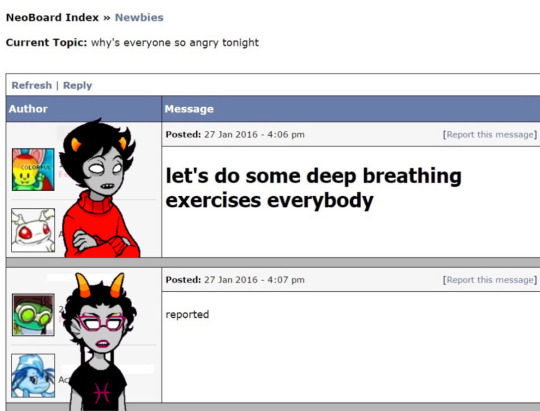

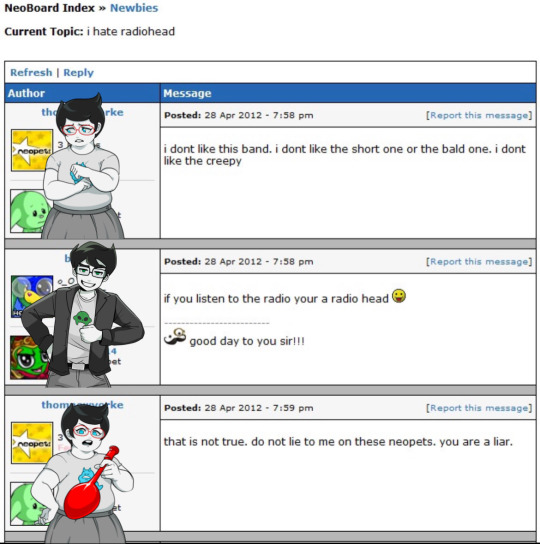






incorrect quotes four: special neopets edition
this one’s shorter but i think it’s the funniest one so it balances out
#y’all might’ve started thinking you’d seem the last of me#no i am very much alive and well#i’m just having a bit of a rough go of it lately#and i recently started getting into ATSV as well as homestuck so there’s that too#but i’m mostly good#cgat homestuck#homestuck#homestuck shitpost#incorrect quotes#kankri vantas#meenah peixes#jake english#jane crocker#dirk strider#rose lalonde#gamzee makara#equius zahhak#sollux captor#tavros nitram#cronus ampora
576 notes
·
View notes
Text
Tsukasa works FOR Sakura
Now this is very likely me just being slow and not connecting the dots until now, but chapter 109 has made me realise that Tsukasa is not the one in charge of the "destroy all yorishiros" plan... It's Sakura.

It's this line here that's made me finally see the light, Tsukasa has to "help Sakura, by destroying the yorishiro." He is not actively desiring the yorishiro to be destroyed, he's just doing his part in the plan. In chapter 106, he wasn't even phased that Nene didn't want to destroy the yorishiro and the only reason he persisted was because it was "his job."

Even way back in chapter 93, Sumire describes Sakura as the one No. 6 serves. Sakura gave him the job of destroying his own yorishiro, not Tsukasa.


Sakura is the one who wants the yorishiros destroyed, she's been trapped inside the school for 100 years and is tired of it. She wants to leave whatever duty is keeping her bound
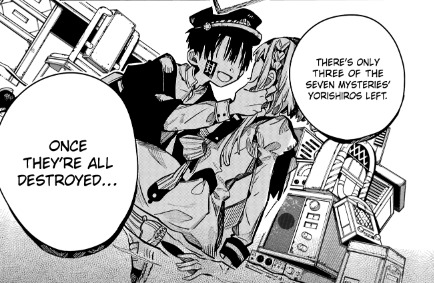

And she is more than willing to make sacrifices to make her wish come true

Sakura is behind everything, she is the reason that Tsukasa was freed from where he was trapped (very likely Hanako's boundary).

She is also the one altering the rumours.

Tsukasa, as cunning and intelligent as he may be, is probably a bit too impulsive to be the brains behind the entire operation. His intense curiosity for things would likely get in the way, no matter how well he means or how serious he's being.
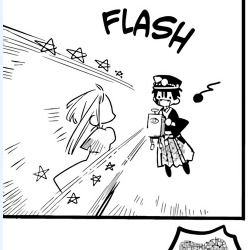


And again, it's clear Tsukasa is not as invested in destroying the yorishiros as we are initially led to believe. Again, he really doesn't mind that Nene no longer wants to destroy yorishiros anymore
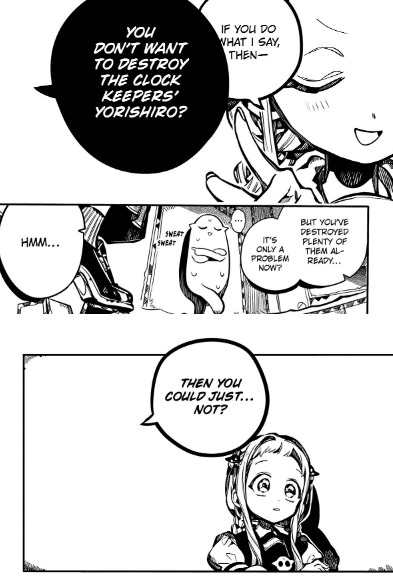
In fact, it's Natsuhiko who worries Nene won't destroy them. Keep in mind Natsuhiko is 100% loyal to Sakura and not necessarily to Tsukasa. If this was Tsukasa's plan, I doubt he would be worrying over whether Nene will keep doing her part as the kannagi

The only reason we even initially thought this was all Tsukasa's doing, was because Sakura painted a picture that she was in a similar situation to Nene.

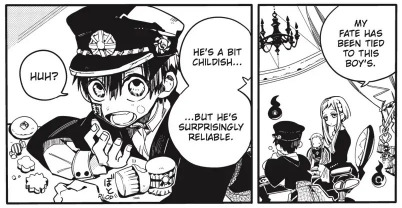
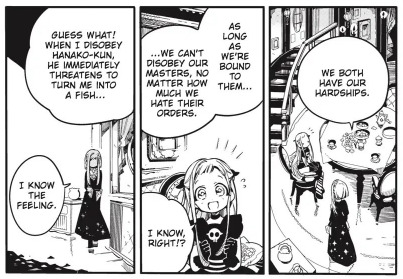
Sakura gives the impression that she can't go against Tsukasa, that he is her master. But that can't be right, because we know Sakura was the one who appointed the 7 mysteries in the first place. And she was also the one who freed Tsukasa, so how could he be the "master" in this relationship?
I think, Sakura said all this to gain Nene's trust.
Nene, being the modern kannagi, is absolutely vital in the plan to destroy the yorishiros. So having her trust Sakura would help out immensely.
So overall, whether it's the price he's paying for having been freed-- or for some other reason entirely-- it's quite clear to me now that Tsukasa is not the one in charge of the "destroy the 7 mysteries" plan. He's absolutely a major key player, with his cunning and curious mind clearly being an advantage (figured out the fastest and easiest route to stopping time so he could access the clock-keeper's boundary with Nene). But he is doing all of this to help Sakura, it's not for himself.
#tbhk#jshk#toilet bound hanako kun#jibaku shounen hanako kun#tsukasa yugi#sakura nanamine#tbhk theory#it wouldn't surprise me if everyone had already came to this conclusion long before this chapter#I'm just slow sorry lol#Tsukasa is too impulsive and gets distracted too easily to be the mastermind imo#but don't get me wrong he is extremely cunning and smart#only when he's interested tho#plus it really doesnt seem right that Tsukasa is the master of the one who freed him#bit sus there ngl#pls don't roast me too much for being dumb#sorry this post is a bit all over the place
228 notes
·
View notes
Text
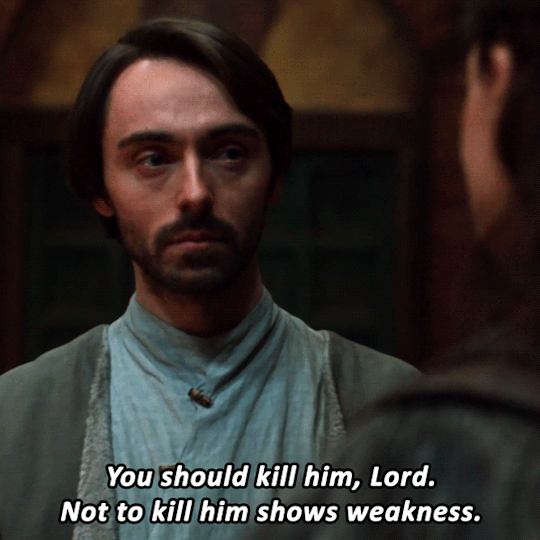

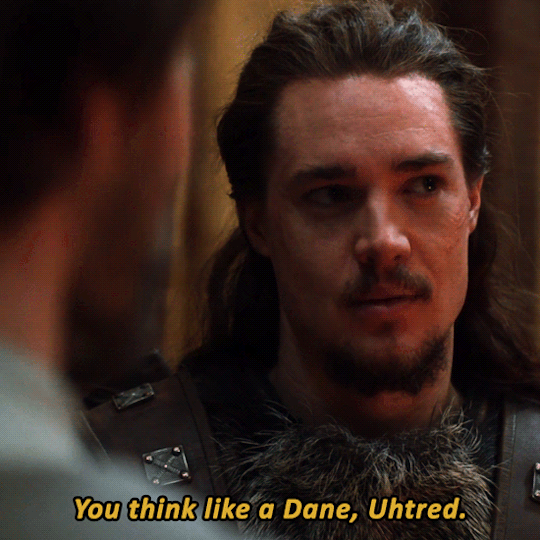
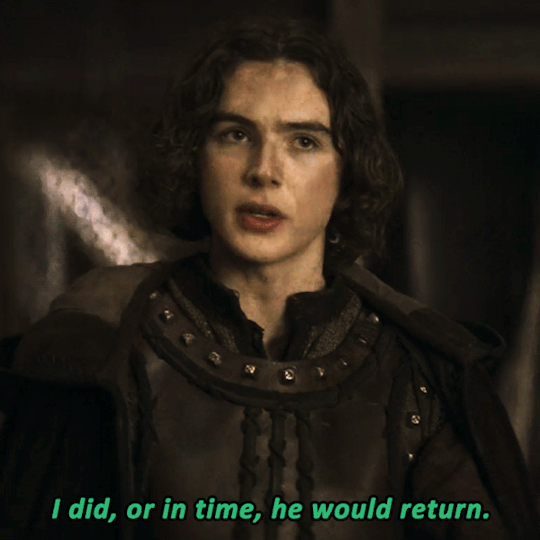
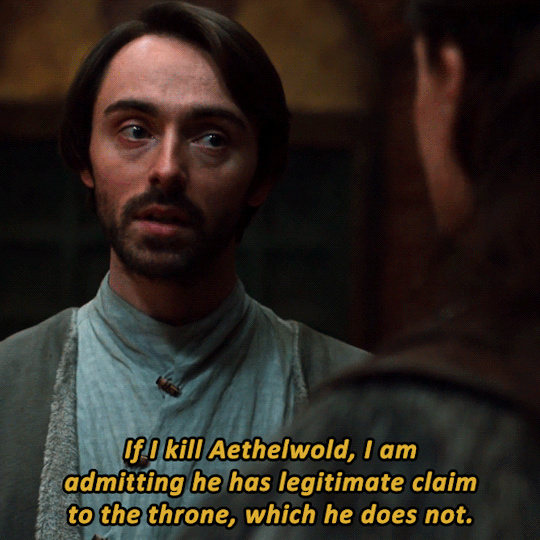
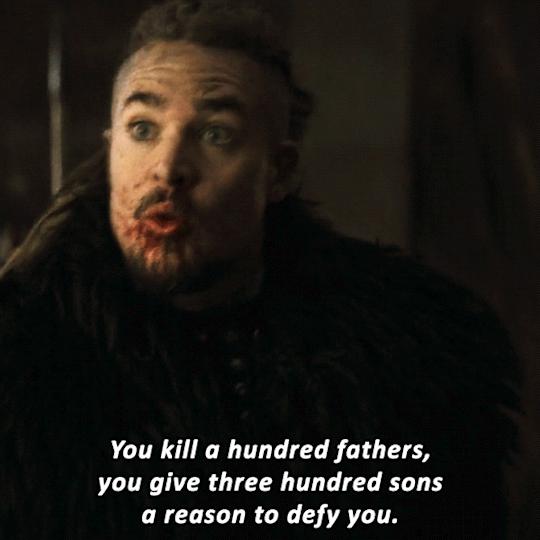
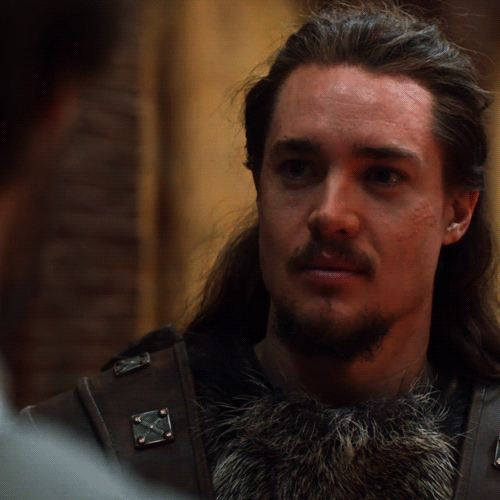
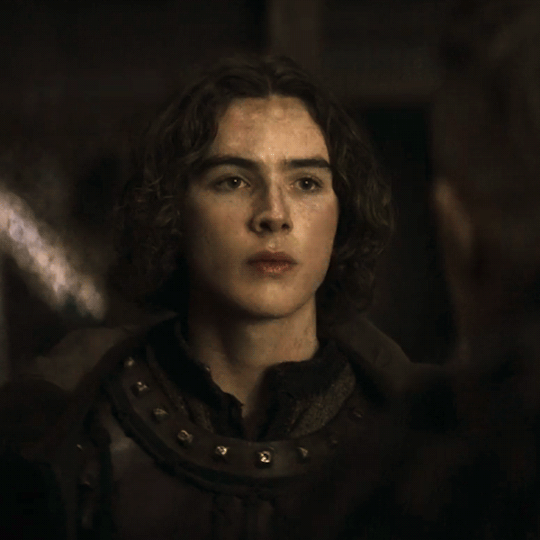


A good King relies upon good advice, Uhtred.
I speak only as a man who has made mistakes before.
#me once again pushing the agenda that uhtred basically became alfred when he got older#but he probably forgot how bad he was when he was younger#i mean yeah he totally knew he wasn't very nice but i doubt he ever realised just HOW MUCH he wasn't nice#like the moment when he got upset with stiorra because she didn't want to kneel in front of edward#okay but at least she didn't scream at edward's face insulting him in front of the whole witan like YOU did with alfred#but apparently he forgot#i should make parallels of that too actually#the parallel between aethelstan's reaction and uhtred's at being told those things makes me laugh a bit#because aethelstan seems to know that what he was doing was not the right thing#while uhtred was just an arrogant idiot#the last kingdom#seven kings must die#alfred x uhtred#tlk alfred#uhtred#tlk aethelstan#aethelstan#david dawson#alexander dreymon#harry gilby#my gifs
124 notes
·
View notes
Text
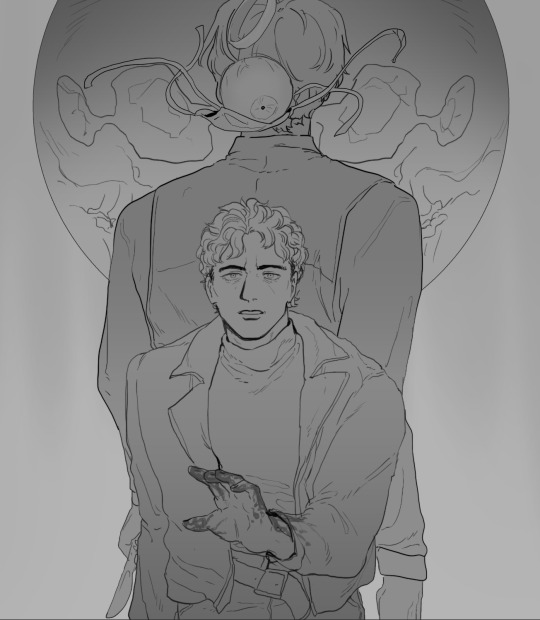
some daan marcoh doodles around some dialogue bits I hit in game haha - gave me some thoughts on how one could think of daan if you only bumped into him at certain points?
I don't remember the lines exactly but there were a few like this?
'Are you moving on? I guess we'll split ways here.'
'Someone has figure out how to treat these people...'
'You were very heroic stepping in there.'
'In the dark, your thoughts can really get to you out here...'
'Am... I... still a good man? Or...'
#fear and hunger#daan fear and hunger#marcoh fear and hunger#kickdraw#daanmarcoh#keep getting dialogue and I feel like if you only saw certain parts of Daan he seems like a very noble doctor figure#trying to research/avenge his dead almost(?) wife - staying behind to diagnose the villagers#meanwhile marcoh has like only killed one guy and is trying so hard to be a good person but is sinking in that Guilt#if daan stepped in on the marcoh held at gunpoint bit - I feel like it would fit Marcoh's lines about 'being heroic' or whatever#maybe he would be comparing himself to him - like 'im not a good man cause thats what a good man looks like in this situation'#and later when marcoh has a reality check he has to be like ... oh.... he's actually like this... huh#I feel like daan would hate it if anyone thought of him like this hakfjghadfg - but that makes it crunchier in my mind :)#daan starts looking much less like a tragic romantic protagonist when he is bickering with the party and getting dunked on#this weird image leaves the second you take both of them into the sewer and daan just starts complaining at him about the smell too often#sorry marcoh your fantasy protagonist man only exists in your dreams :) I think he'd still like him after getting a more realistic view tho
363 notes
·
View notes
Text
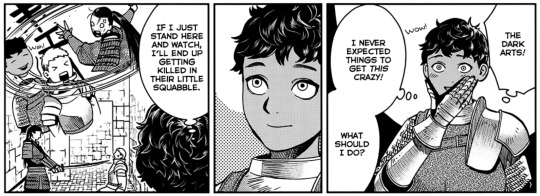
I actually think switching the "what should I do" to "I wonder what will happen next" to cue in the Falin reveal was a good move from trigger, but I still hope we get to see his little mental image next episode
#it makes him seem a bit too sinister if you take off too much of his internal dialogue#we cannot forget just how much of a weird dumb baby (affectionate) he is#kabru#kabru of utaya#kabru dungeon meshi#dungeon meshi#dunmeshi
72 notes
·
View notes
Text

Sweater weather shenanigans
Plus the lines, before I throw colours on it like an excitable squirrel:

#yes i am aware that squirrels are colour blind#anyhow#sometimes i draw things#tissaia de vries#yennefer of vengerberg#it's been *cold* lately and i hate going outside so much#ill think of my blorbos being warm and cozy and comfy thank you#every lesbian's dream: to have an older girlfriend whose lap you can use as a pillow plus she will make you hot drinks if you ask nicely#yes tissaia in frumpy comfy cardigans. she has a collection of tartan blankets too. she's very Grandpa fight me#yennefer in one of those super large but comfy looking turtle neck cream colour sweaters and grey sweatpants#she wears the sweatpants as an experiment because everyone her age seems to go crazy over their partner wearing it so whats about tissaia#(tissaia doesn't give a shit about sweatpants. doesn't own them. doesn't need them. doesn't find them aesthetically pleasing)#(i've used the word comfy way too many times in these tags and i don't regret it one bit)#also i have that seal plush. just smaller
106 notes
·
View notes
Text

butterscotch cinnamon pie my beloved 🥧💖
#holoska rambles#the filling only looks a bit lumpy in the photo. it's been in the fridge for a few hours and seems to have settled#it's just too dark to take another photo with decent lighting now >:/#but the crust turned out way better this time! still could be prettier but it's so much easier to look at than last year's ahah#now I just have to hope it sets in time to be able to eat a piece on my birthday. because last time it Did Not#birthday tag
166 notes
·
View notes
Text
Kaz: I am NOT “gaslighting” you. I am lying to you. Gaslighting implies a level of effort I am simply not putting in.
Pekka:
Kaz: Deceiving you doesn’t require much
#kaz is lying#he has put in so much effort to seem effortless#he aint fooling anyone#we need like the opposite of ship names#like when two characters just fukin HATE each other#pekka rollins#kaz brekker#kakka?#thats a bit too kkk-ish#pez? thats a 90s candy#pekka brekker 😭😭😭
143 notes
·
View notes
Text
There’s a general consensus that above all else Jason should be homicidal again. However I think what’s also very important is that he should be a fucking hoot.

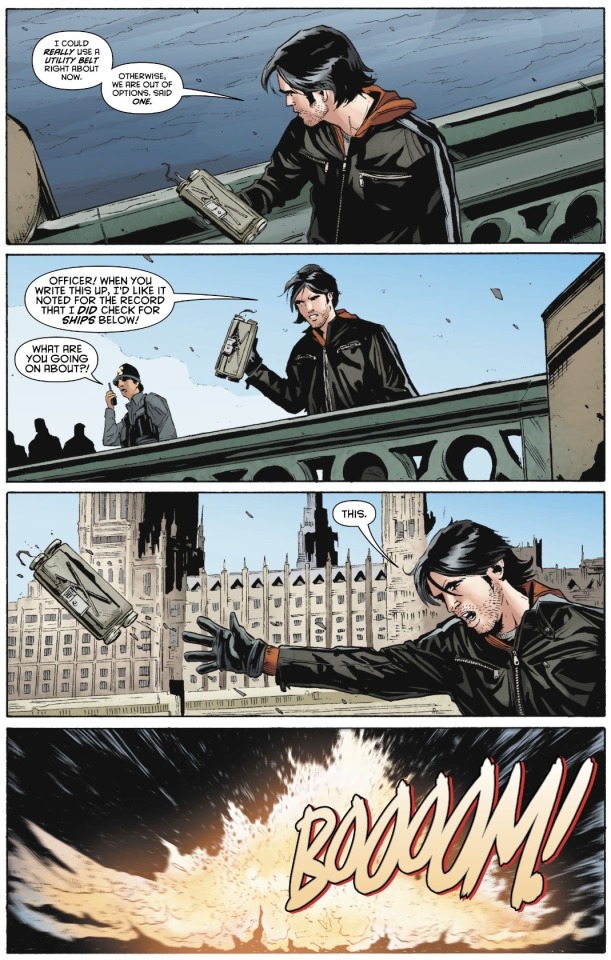

There’s nothing not funny about this entire bit.
1. He couldn’t give less of a shit about explaining that he’s single-handedly trying to stop a terrorist attack. Obviously cause he’s short on time, but even if he had all the time in the world he would still be this indifferent towards explaining himself to cops.
2. This bomb is seconds away from exploding but he’s at most mildly annoyed like he’s in the office doing some menial task.
3. The perfectly timed British jokes.
4. Circling back to number 1 on the list. After he throws the bomb into the water he just dips. For all they know he’s the (weird) terrorist. (But as long as everyone’s okay he doesn’t care! The beauty of Jason Todd everybody).

This one is funny (but it’s also true)? Like yes … that is exactly what you are. (A sweet, kind-hearted goodboy learning how to effectively poison people, shoot guns, and blow shit up with all manner of explosives like a certified pro).
Bonus:


Red Hood: The Lost Days #5 (2010-)

Red Hood: The Lost Days #4 (2010-)
“Not so irritating for an American” is a far more impressive title than “genius” if you ask me. Although I think Jason balances both pretty well.
#lost days was actually a comedy it gets funnier every time I reread it#look I know in recent days he’s become more serious/glum as a character#he’s sorta detached from people and situations and he seems to have lost his spunk#and my mind is zoning in on Zdarsky. him feeling immense guilt and burden over people he kills.#which like. even Matt Murdock fans said Zdarsky leaned a bit too heavily into Catholic guilt lol#Jason should be like this again#boiling inside him is untamed rage and pain and hurt but the jokes keep rolling off his tongue in an endless stream#just as playful with his words as he is with his bombs and takeover plans#from moments like the bomb under the bridge or even just the 'nice boy' comment#you see just how much he not only doesn’t care about being labelled a hero for his actions but how he actively detests it even#it’s one of the things that makes him so endearing to me like: look at this humble kind kid who loves and cares for the world immeasurably#(even after all he’s suffered from it)#but refuses to ever take credit for it#jason todd#red hood#red hood: the lost days#lost days#dc
155 notes
·
View notes
Text
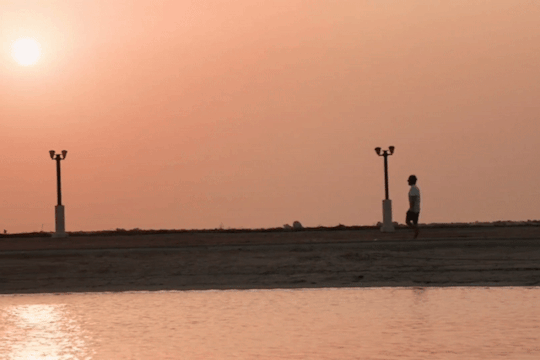


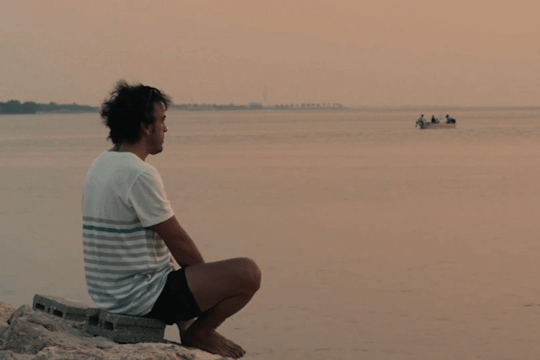

Fernando S2E2 - "Welcome Home"
#theres a lot of other random things i wanna post from this ep but this montage particularly stuck w me#waaahhh he seemed so lonely :((#THEY MADE HIM GO TO ABU DHABI ALONE OKAY :<#he misses his parents and sister so much sob sob#so he had to have a cinematic moment hahaha#like seriosuly just like that random moment w carlos sr from the first season its seriously so cinematic#like pls tell me in the tags what kinda movie this would be from hahaha#so the other stuff i might post is basically him just being puppy sad in his hotel room#...and i also took way too many clips of his hands cause...reasons. so uh yeah lmk if i should in fact make that#fernando alonso#f1#formula 1#fernando(show)#fernando s2e2#i love how ive posted other content from this ep(twink montage) but i feel like it got shadowbanned LMFAO#we do a little bit of f1
117 notes
·
View notes